radon exposure

Radon exposure is a health hazard with a simple solution. Radon is an invisible, odorless radioactive gas in the earth that can enter into lower level rooms of your home, like a basement. The longer you and your family are exposed to radon, the greater risk you have of developing lung cancer. Testing for radon is easy, affordable and the best way to protect your family from exposure. Radon test kits are available at home improvement stores or online. For more information, click here.
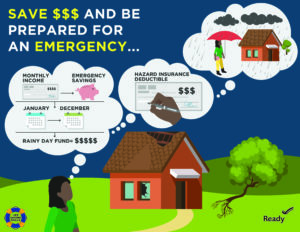
Tragedy can strike at any moment, which is why it is fundamental to prepare for any situation. Financial tragedies don’t discriminate. They can happen to anyone at any time. By creating a plan, this can allow you and your family to bounce back from unexpected circumstances faster with less consequences. You will never regret being too prepared.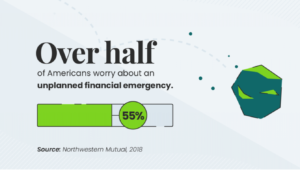
prepare now
Consider setting up direct deposit.
Create an emergency savings account.
Evaluate appropriate insurance coverage.
- Flood Protection: Many policyholders are surprised to learn that standard homeowners insurance policies don’t contain flood coverage by default. If your area is prone to flooding, look into adding flood protection to your policy.
- Renters Insurance: If you’re not a homeowner, you may think you’re covered under your landlord’s homeowners insurance policy. While this is true for the structure of the home, it doesn’t cover your belongings. That’s where renters insurance comes in. At just $20 or less each month, it’s a worthwhile investment.
- Auto Insurance: In addition to collision insurance, consider comprehensive car insurance, which will cover your vehicle from the most common natural disasters, including floods, fire, hurricanes and earthquakes. It’ll also cover you in case of smaller-scale damages that are out of your control, like a tree falling on your car.
- Life Insurance: covers the unlikely occurrence of death via natural disaster. It can help your family pay off debts and cover housing payments and living expenses in the event of your death. It is an important part of your financial emergency preparedness plan.
Document Valuables.
Compile physical copies of important documents.
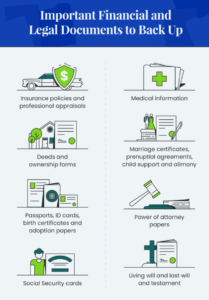
regarding covid-19
- Be cautious about sharing personal financial information, such as your bank account number, social security number, or credit card number.
- Do not click on links in texts or emails from people you don’t know. Scammers can create fake links to websites. Visit government websites, like cdc.gov/coronavirus, directly in your internet browser.
- If you have been exposed to COVID-19, a contact tracer from your local health department might call you to let you know and ask you to self-quarantine at home away from others. Discussions with health department staff are confidential. They will not ask for financial information.
- Keep in mind that scammers may try to take advantages of financial fears by calling with work-from-opportunities, debt consolidation offers, and student loan repayment plans.
emergency financial first aid kit
At Home
Store important documents either in a safety deposit box, an external drive or on the cloud to make it easy to access during a disaster.
Take time now to safeguard these critical documents. Be cautious about sharing personal financial information, such as your bank account number, social security number, or credit card number.
Household Identification
- Photo ID (to prove identity of household members)
- Birth certificate (to maintain or re-establish contact with family members)
- Social Security card (to apply for FEMA disaster assistance)
- Military service
- Pet ID tags
Financial and Legal Documentation
- Housing payments (to identify financial records and obligations)
- Some individuals and households may experience financial difficulty because of the pandemic. If you do not think you can pay your loan payments on time, immediately contact your bank and discuss your options before skipping any payments or taking any other actions contrary to the terms of your loans.
- Insurance policies (to re-establish financial accounts)
- Review your travel insurance and health insurance to see how your policies handle pandemics and infectious disease outbreaks like coronavirus disease 2019 (COVID-19).
- Sources of income (to maintain payments and credit)
- Tax statements (to provide contact information for financial and legal providers and to apply for FEMA disaster assistance)
Medical Information
- Physician information (in case medical care is needed)
- Copies of health insurance information (to make sure existing care continues uninterrupted)
- Immunization records
- Medications
Insurance Information
Having insurance for your home or business property is the best way to make sure you will have the necessary financial resources to help you repair, rebuild or replace whatever is damaged. Document and insure your property now.
Household Contact Information
- Banking institutions
- Insurance agents
- Health professionals
- Service providers
- Place of worship
stay safe during a financial disaster
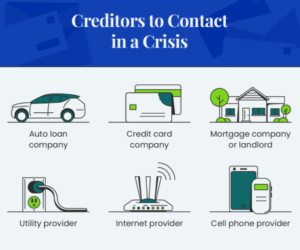
Contact your creditors. If you’re finding it difficult to make monthly payments, contact your creditors to avoid your credit taking a dive to ask if there are any forgiveness policies given the circumstances. Many credit card issuers will offer emergency support, especially if the effects of the disaster are widespread. This may entail collection forbearance or increased credit limits.
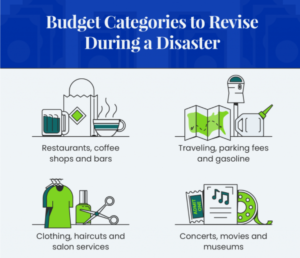
Revisit your budget. During tough times, you’ll want to re-evaluate your budget to see what unnecessary expenses you can cut out. This will make it easier to put extra money into your emergency fund.
after a financial disaster
Be wary of scams.
File necessary insurance claims.
Invest in home improvements to reinforce safety measures.
preparing your finances in case of natural disaster
for more information:
-
Students and financial literacy: https://www.annuity.org/financial-literacy/students/
-
How to teach kids about money: https://www.annuity.org/financial-literacy/how-to-teach-kids-about-money/
-
https://www.fema.gov/sites/default/files/2020-08/effak_toolkit_largeprint_20190904.pdf
attacks in crowded and public spaces
What are mass attacks?
- Active shooter: Individuals using firearms to cause mass casualties.
- Individuals using a vehicle to cause mass casualties.
- Individuals using homemade bombs to cause mass casualties.
- Other methods of mass attacks may include knives, fires, drones or other weapons.
prepare now
- Stay Alert. Always be aware of your environment and any possible dangers.
- If you see something, say something to local authorities. That includes suspicious packages, people behaving strangely, or someone using strange communications.
- Observe warning signs. Signs might include unusual or violent communications, expressed anger or intent to cause harm and substance abuse. These warning signs may increase over time.
- Have an exit plan. Identify exits and areas to hide wherever you go, including work, school and special events.
- Learn lifesaving skills. Take trainings such as You Are the Help Until Help Arrives and first aid to assist the wounded before help arrives.
- Practice wearing a mask when in public to slow the spread of COVID-19. You will not have time to put on a mask in an active shooter situation. Wearing one regularly will allow you to be prepared to hide safely with those who are not a part of your household. Masks should not be worn by children under two, those who have trouble breathing, and those who are unable to remove them on their own.
stay safe during
Run to Safety
- Seek safety. Getting away from the attacker is the top priority.
- Leave your belongings behind and get away. If you are not wearing a mask, do not stop to put one on. It is more important to run to safety.
- Call 9-1-1 when you are safe and describe the attacker, location and weapons.
Cover and Hide
- If you can’t evacuate, cover and hide. Find a place to hide out of view of the attacker and if possible, put a solid barrier between yourself and the threat. If you are hiding with people who are not part of your household, wear a mask and maintain a distance of six feet between yourself and others, if possible. Children under 2 years old, people who have trouble breathing, and people who cannot remove masks on their own should not wear them. Do not leave your hiding place to retrieve your mask.
- Lock and block doors, close blinds and turn off lights.
- Keep silent.
Defend, Disrupt, Fight
- Fight only as a last resort. When you can’t run or cover, attempt to disrupt the attack or disable the attacker.
- Be aggressive and commit to your actions.
- Recruit others to ambush the attacker with makeshift weapons like chairs, fire extinguishers, scissors, books, etc.
- Be prepared to cause severe or lethal injury to the attacker.
Help the Wounded
- Take care of yourself first and then, if you are able, help the wounded get to safety and provide immediate care. If you are experiencing a medical emergency, call 9-1-1 and let the operator know if you have, or think you might have, COVID-19. If possible, put on a mask before help arrives.
after
When Law Enforcement Arrives
- Remain calm and follow instructions.
- Keep hands visible and empty.
- Report to designated areas to provide information and get help.
- Follow law enforcement’s instructions and evacuate in the direction they tell you to. When possible, maintain a distance of at least six feet between yourself and people who are not a part of your household and wear a mask to slow the spread of COVID-19. masks should not be worn by children under two years old, those who have trouble breathing, and those who are unable to remove them on their own.
- Once you are out of danger, continue taking steps to protect yourself from COVID-19 and other infectious diseases, by washing your hands, maintaining six feet between yourself and persons who are not part of your family, and avoiding touching your eyes, nose, and mouth.
Monitor Communications
- Listen to law enforcement’s messages for information about the situation. Share updates with family and friends.
Consider Seeking Professional Help
- Be mindful of your health. If needed, seek help for you and your family to cope with the trauma.
- Engage virtually with your community through video and phone calls. Know that it’s normal to feel anxious or stressed. Take care of your body and talk to someone if you are feeling upset. Many people may already feel fear and anxiety about the coronavirus 2019 (COVID-19). The threat of an active shooter can add additional stress. Follow CDC guidance for managing stress during a traumatic event and managing stress during COVID-19.
run. hide. fight
